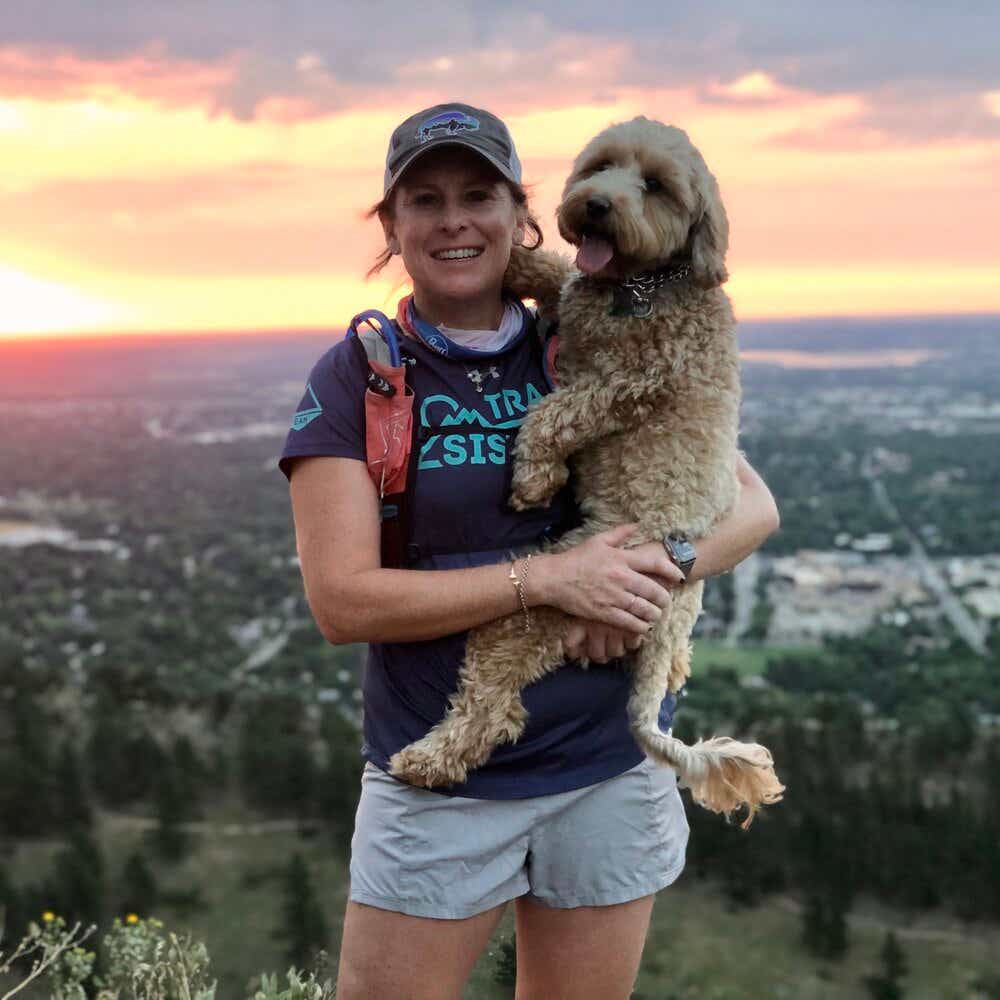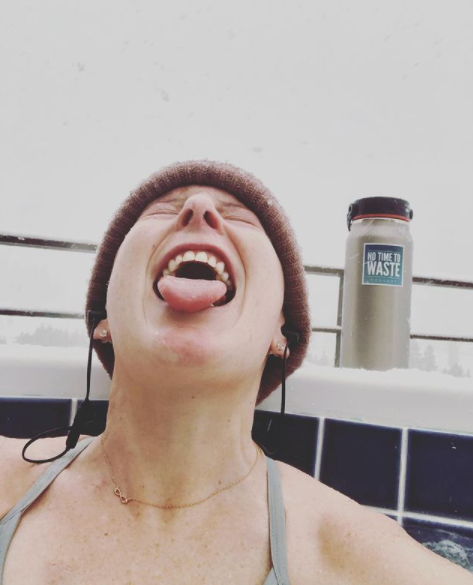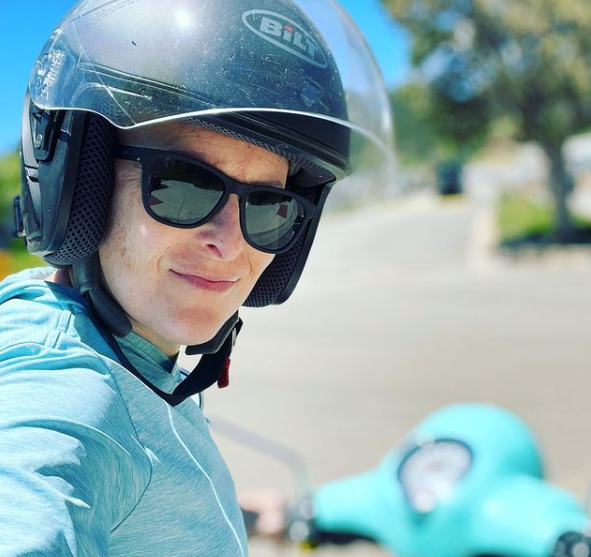Alison Hadden was a lifelong athlete, adventurer, and marketing executive when she was diagnosed with advanced breast cancer at 38. It metastasized to her brain in 2020, which means she’s now grappling with a terminal diagnosis. But she’s also on a quest to leave her mark on the world: Her podcast, No Time to Waste, is devoted to conversations with big-name guests like Matthew McConaughey, Nora McInerny, Lance Armstrong, Chelsea Handler, Andy Puddicombe, and even Katie. (Here’s a link to that must-listen episode.) On the show, they talk about how their lives have been touched by grief, and the incredible things they’ve learned in the process.
Though it might seem intimidating (or just unpleasant), Hadden’s devoted to helping people confront their mortality — in the hope that it’ll help them live today with more intention and meaning. We asked her to tell us about the creation of the podcast, and what it’s like to live boldly in the face of death.

You were given a terminal cancer diagnosis in August 2020 and are now “living in three-month increments.” Why did you decide to dedicate your life to No Time to Waste?
Initially, it came from a burning desire to violently shake everyone I passed and yell at them to be grateful for every single day and stop wasting time, because none of us know how much we have left. Realizing that would be both scary and unproductive, I started accepting invitations to speak on stage which led to learning how to produce a podcast after Covid cancelled events, and I didn’t want to stop spreading the message because people told me how much it was helping them.
Now, in many ways, it feels like everything in my life — personally and professionally — has led to here; that spreading this message of No Time to Waste is what I was put on this Earth to do. I have the privilege of having these incredibly rich and intimate discussions with exceptional humans. That’s been so healing and soul-filling for me personally. I’m fueled by an insatiable drive to help as many people as possible, in a way that only I can.
I like to say I’m so unlucky in that my cancer continues to progress, but so lucky that I’ve found myself finally living the purpose-driven life I always knew I was meant for — it’s just come at quite the cost.
Your podcast is about how to live, but it’s also about how to die. What have you learned through these interviews?
I’ve learned so much, and I continue to evolve and grow with every conversation. If I had to distill all of it, here’s what I know:
-Just as we cannot have life without death, it’s in confronting our mortality that we are able to live most fully. The more aware we are of the finiteness of life, the more likely we are to have it influence our decisions every day on how to spend our precious time. That should result in a life with more meaning and intention — a good life.
–Grief is incredibly complex and non-linear. It’s experienced and expressed differently by every individual, and isn’t limited exclusively to feelings of sadness. There can be beauty, joy, and big, big love that can sit alongside those feelings of loss. We just need to learn how to hold those all of those feelings at the same time. And grief doesn’t have to be the loss of a loved one — it can be the loss of anything held dear. So, in many ways, the entire world is in the midst of processing their grief around the pandemic. I’m grateful it’s become part of the global conversation.
-It’s in talking about death and dying — bringing the conversation into the light — that we actually ease the suffering of those grieving, because silence isolates. You’d think with death being the only universal inevitability, we’d be more comfortable talking about the topic. But sadly, we still avoid it. And I believe the human race deserves better.

You talk about how taboo death still is. What advice do you have for people who have friends and family who’ve lost a loved one, but don’t know how to help?
So often, people apologize in hindsight for going dark because they didn’t know what to say. So for starters, reach out and say something — anything — without expectation. Just let them know you’re thinking about them. It could be as simple as “I’m so sorry. I have no words. I just want to to know we’re here and thinking of you often.”
I’d also recommend instead of asking “how can I help?” you just tell them what you’re going to do to help (drop off meals, mow their lawn, shovel their snow, take their dog for a walk, etc). Because the griever is likely not in a place to make decisions, and you don’t want to burden them. Then I’d make a note in the calendar to check back regularly, because after the initial barrage of support, life gets quiet and grievers can feel forgotten.
I can only speak from my own experience, though. Rabbi Steve Leder shepherded thousands of families through loss over the last 30+ years: His book, “The Beauty of What Remains: How Our Greatest Fear Becomes Our Greatest Gift” is a field guide for anyone navigating grief. It’s at the top of my recommendation list, but there’s more resources available on my website.
You’ve interviewed quite the lineup on your podcast — which interview surprised you the most?
Peloton Instructor Adrian Williams is this exceptionally strong, fit athlete. But he’s got a beaming smile that hinted at a big heart underneath those bulging muscles. In our conversation, he opened up about some highly personal regrets he carried and showed his vulnerability. He almost channeled Van Jones — someone I admire as a “model of a modern man” who I’d also love to talk to.
Two of my other most-cherished conversations were with Rabbi Steve Leder and my Dad, both sleeper episodes that turned out to be unexpected fan favorites.
I love your philosophy about life after death: Can you share that with us?
I ask every guest for their POV on this. At this point, I have to believe there’s something after our time here on Earth; this isn’t all there is. I can’t tell you exactly what happens but I’m holding on to the hope that this is just one chapter in a long series of adventures. When I think about the wonders of nature, the magic of outer space, and other things my pea-sized brain just can’t wrap its head around, I remind myself I can believe in something I don’t quite understand. Maybe that’s faith?
I’m told by those who’ve sat with hundreds of people in their final hours, that no one is ever anxious or afraid at the end. I’m going to take that as a leading indicator that I’m going to be OK. We’re all going to be OK. So whatever’s coming next is going to be totally different but it’s also going to be amazing. And if this vision brings me comfort during my remaining days on Earth, and I end up being wrong, what’s the harm anyway?
The more I learn about dying, the more comfort it brings me. That’s why I’m so motivated to bring this conversation to the forefront and share the end-of-life resources I’ve only recently discovered. I believe that if only people knew more, they wouldn’t be so scared, so that’s part of what I’m trying to do now with No Time to Waste.
Learn more about Alison notimetowasteproject.com or @notimetowasteproject









